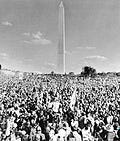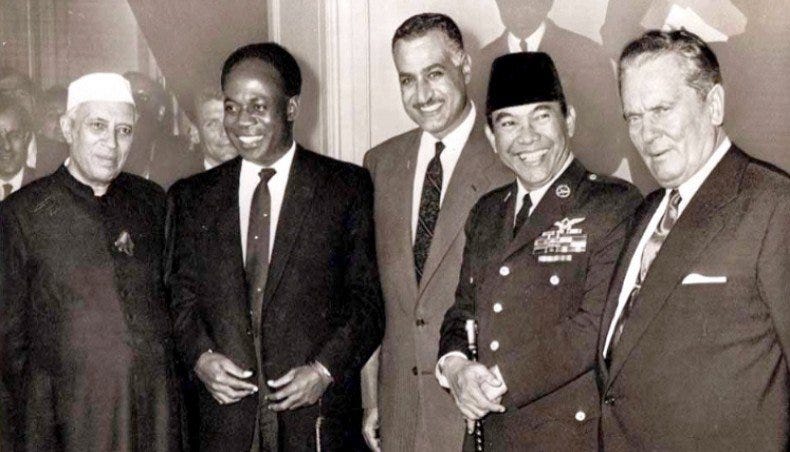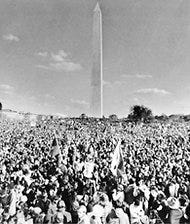Each generation has distinct social, cultural, and technological experiences that shape the values, beliefs, and behaviors of individuals. The field of generational analysis tracks age cohorts, people born over a fifteen-to-twenty-year span, whose similar experiences with respect to national and world events as well as technological developments give rise to similar attitudes and behavior patterns. The Pew Research Center, for example, has found significant differences in the generations with respect to attitudes toward same-sex marriage and the legalization of marijuana, marriage rates, religious affiliation, political party affiliation, and political ideology.
The generational literature defines seven generations in the USA. The Greatest Generation, born from 1900 to 1924, was the Civic-type generation who were the young soldiers, officers, and factory workers during World War II.
The Silent Generation, born from 1925 to 1945, were children and adolescents during the Great Depression and World War II, events that facilitated qualities such as perseverance, resilience, and commitment to traditional values, as well as confidence in national institutions. According to the generational literature, they tend to have respect for authority and a conservative approach to life. The Silent Generation played a central role in the Civil Rights Movement of the period 1955 to 1965 and in other changes associated with the subsequent Boomer generation.
The Baby Boom Generation, born from 1946 to 1964, grew up in a world full of unprecedented possibilities and opportunities, greatly impacted by the emergence of television. They possess an appreciation for diversity and social justice, according to the generational literature, in that they played a central role in the protection of the rights of blacks and minorities, women, gays, and the environment.
The generational literature notes that at the core of the Baby Boom generation is its own brand of individualism, centering on individual choice. The literature maintains that the anti-war movement of the late 1960s and early 1970s primarily took the form of opposition to the military draft, which was against the notion that citizens be required to serve in the armed forces against their wishes. The literature views the “muddled reasoning behind the Vietnam War” as merely a secondary factor, thus obscuring the presence of an incipient anti-imperialist consciousness in the youth revolution of the period, an issue that I discuss below. On this point, the literature overlooks an important social psychological dimension: having grown up in a situation of unprecedented opportunities, the Boomers had fully internalized the notion that America was the land of opportunity and a great nation that stood for the defense of democracy and opportunity in the world. They were shocked and angered to learn as youth that the nation had misrepresented fundamental facts about the history of Vietnam in order to sell the war to the American people, with young American males serving as fodder.
The generational literature maintains that individualism, a worldview that places emphasis on the individual self, became increasingly strong in the subsequent generations. The literature views this as a positive development for the most part, until the arrival of Generation Z, when the utilization of a medical model of victimization and damage to the feelings of individuals produced negative consequences. More on this point below.
Generation X, born from 1965 to 1980 in the context of changing norms with respect to marriage and family, became strong in self-reliance, adaptability, flexibility, and pragmatism. According to the generational literature, they seek a balance of life and work, with a good job and making money having priority over questions concerning the purpose and meaning of life. Gen X’ers came of age after the culture had decided to leave behind collective rules and more fully embrace individualism, such that individuals of the generation are comfortable with attending to their own needs.
The Millennial Generation, born from 1981 to 1996, grew up with internet, social media, and smartphones, which shaped their communication styles and their ways of consuming information. They came of age during a period of rapid globalization and technological innovation and abundant access to information, and they witnessed the transformative power of social media. They are tech-savvy and digitally connected, according to the generational literature. They elevated even further the emphasis on the individual.
Generation Z, born between 1997 and 2012, is the first generation to have never known a world without internet, so that they are also known as “iGen” or the internet generation. The iPhone was introduced in 2007, and by 2011, most teens had smartphones in their pockets, enabling them to check in on social media every few minutes. Spending more time interacting with screens, they spent less time in activities that require face-to-face interaction, with the consequence that they were less prepared for college when they began to enroll in four-year elite residential colleges in 2013. They had been taught to be concerned with their safety, which they understood as not only physical safety but also “emotional safety,” and they suffered from anxiety and depression more than previous generations. At the same time, they have grown up in an environment of consciousness of global threats, and they therefore possess heightened awareness of social issues, as framed and understood in elite-controlled mass media and increasingly manipulated social media, which has become a toxic, modern Tower of Babel.
The literature on generations reads like an abstraction placed over unfolding actual historical and political events, which themselves are only superficially understood in the literature. Nonetheless, I think that the notion of unique characteristics of generations, rooted in the particular experiences of each, has importance with respect to three of the generations, namely, the Greatest Generation, the Baby Boom Generation, and Generation Z.
The Greatest Generation fought and won World War II. It participated in the worldwide liberal/progressive/communist alliance against fascism, German militarist expansionism, and antisemitism, symbolizing the triumph of democracy over totalitarianism and of good over evil. The members of the Greatest Generation patriotically made personal sacrifices in the expansion of the armed forces and in the conversion of national production to support the war effort. It brought the USA to the zenith of its economic power and world prestige, to its period of greatness and power.
It was a generation that was truly great, but it was not perfect, for its understanding of the world was distorted by the Truman administration and Truman’s main foreign policy advisor Secretary of State Dean Acheson. Following the Second World War, the emerging neocolonial world-system already was demonstrating that the colonized peoples of the world were not going to accept a neocolonial world order. In that global political reality, and taking into account its power and prestige, the United States could have led the world toward the construction of a neocolonial world-system that itself was designed for a gradual but definitive transition toward a post-imperialist world order, moving irrevocably toward a world-system characterized by the sovereign equality of nations, respect for the right of all nations to control their national economies and their natural resources, and non-interference in the internal affairs of states, as expressed by the leaders of the emerging nations of the time. The United States, having reached the culmination of a spectacular ascent of two hundred years, possessed the economic and financial resources and the worldwide prestige to lead the world in the implementation of such a post-colonial and post-imperialist world order, which would have been the foundation for a form of globalization and modernization characterized by peace, stability, and prosperity.
But in spite of the objective possibilities for such a transition to a democratic world order, the USA took a different road, dedicated to the intensification of its economic advantage vis-à-vis the colonized and neocolonized peoples of the world, in alliance with Western Europe and Japan. The ideological construction of the Cold War was its principal weapon. The Cold War ideology, in the first place, exaggerated the undemocratic dimensions of the political system of the Soviet Union, portraying it as the essence of totalitarian evil, in the same category with Nazi Germany. In the second place, it falsely portrayed the Soviet Union as expansionist, when in reality, the Soviet Union was interested only in alliance with and indirect influence over the Eastern European nations on its western frontier. In formulating this buffer zone defense strategy, the Soviet leadership was unable to ignore the three times in which Russia had been invaded by military forces of the nations of Western Europe, the last being the Nazi German invasion during World War II, which ended in a decisive patriotic Russian triumph, but at great human cost. Thirdly, the Cold War ideology falsely portrayed the Third World nationalist movements as examples of spreading communist influence, obscuring the essentially anti-colonial character of said movements, which were seeking to build a world order, as they themselves repeatedly proclaimed, characterized by the sovereign equality of nations, in which the once colonized nations would have equal voice as an inseparable part of humanity.
The Cold War pervaded all aspect of American public discourse, constructing a democratic façade for U.S. imperialist policies throughout the world, policies that were dedicated in fact to ensuring access to the raw materials, cheap labor, natural resources, and markets of the once-colonized regions of the world. Although the emerging neocolonial world-system possessed a façade of democracy, it was in fact the antithesis of democracy, in the sense that it denied the natural and democratic rights of states and peoples to control their national economies and their natural resources.
The period of 1966 to 1972 was a time of awakening of political consciousness among youth in the USA, characterized in its most insightful moments by a capacity to see through the democratic façade that had been constructed by the Cold War ideology. As the generational literature points out, most of the leaders of the political awakening were from the silent generation (born from 1925 to 1945). The role of Boomers in the period, the oldest of whom were twenty years old in 1966, was to disseminate the new ideology throughout the society and to make countercultural values mainstream.
In looking at this period in which the Baby Boomers became a subject in human history, the generational literature follows the path of the majority of the Boomers, thus seeing the anti-war movement primarily as a self-expression of individualism, through which the hippies of the ‘60s evolved into the yuppies of the ‘80s.
Following the path of the majority of youth of the period, the generational literature overlooks the important breakthrough of the most insightful of the leaders and intellectuals of the young generation of the period, who had no interest in such categorizations as Boomers and Silents. They defined and referred to themselves as youth, more precisely youth in revolution, and they proclaimed their discernment of the hypocrisy of the democratic façade.
Two important political events drove the youth awakening of 1966 to 1972, which the generational literature touches upon only superficially. The first was the African-American movement, which from 1917 to 1965 had forged a mass struggle, in the North and South, for the full protection of the political, civil, social, and economic rights of black citizens, in accordance with the founding principles of the American Republic. However, from 1960 to 1965 in the South, there occurred a radicalization of youth in the movement, who were disappointed with the inconsistent and slow reaction of the federal government to just movement demands, and with the government’s tolerance of violence toward black citizens. In response, a movement for black consciousness and black empowerment occurred, which appropriated themes that had been formulated by Malcolm X in the urban North in 1964. Malcolm had put forth a vision of black nationalism, which he defined as black control over the institutions of the black community; and which he combined with the notion that blacks in the United States have common interests and common cause with the colonized peoples of the earth.
In accordance with these dynamics, “Black Power” was proclaimed by Stokely Carmichael in a march in Mississippi in 1966. Shown on national television evening news, the slogan galvanized college students, black and white, in the North and South. At the same time, black power dovetailed with an emerging anti-war movement, in that black power stressed alliance with the anti-colonial movements of the colonized and neocolonized peoples of the earth, including the people of Vietnam.
The U.S. escalation of the war in Vietnam, undertaken from 1965 to 1968, was the second important political event that drove the youth awakening of 1966 to 1972. The student anti-war movement included “teach-ins,” informal discussions of relevant readings, and endless discussions, debates, and arguments among youth, who were driven by a desire to understand a world that had previously been hidden by a façade, and to understand what they, as moral individuals, ought to do with this discovery. All were included in the open process of discussion occurring in university public spaces, blacks and whites, women and men, and undergraduate and graduate students and professors. Some professors participated through their work, assigning or recommending relevant readings. For college students in residential colleges of the period, it was a process that could not be avoided, not because it was imposed, but because it was pervasive.
The emerging anti-war critique rejected the fundamental assumption of the Cold War that the United States was a democratic nation that was defending democracy in the world. The imperialist pretentions of the nation were made undeniably evident by the informed, sustained, and pervasive discourse of the youth revolution. Compared to the anti-imperialist insight, things like drugs, sex, free love, music, and hippie styles of dress and performance were merely a side show, even a distraction. The essence of the phenomenon was the discovery by youth—provoked by the unanticipated heroic resistance of the people of Vietnam and stimulated by the awakening of black consciousness—that the nation, including political and religious leaders and their own parents, had lied to them: the USA only pretended to be democratic in order to justify its imperialist interests.
No one suggested, except in occasional moments of anger and profound disappointment, that the United States of America was in essence evil. What was discovered was not evil, but pretense in the name of self-interest. The government of the United States was claiming, with the support of moral authorities throughout the nation, that it was defending the sacred founding principles and values of democracy for all, when in fact it was pursuing imperialist interests. If there were good reasons for such an imperialist policy, the youth believed, then this should be openly put forth, rather than hypocritically obscured, so that the people could openly and freely debate the question. But the people should not be lied to in order to attain their support, which included support in the form of coerced military service. For the youth of the period, it was a fundamental betrayal of them by the generation of their parents, which rendered entirely suspect any arguments that reflect a cold war perspective. For anti-imperialist youth, the Cold War ideology had been exposed and delegitimated, making necessary a fundamental ideological reformulation.
Thus, anti-imperialism was the key insight of the historic moment. It should have been an insight preserved for the ages, the basis of further ongoing debate by the people of the principles that ought to guide the foreign policy of the nation with respect to the neocolonized peoples of the earth. But it was not to be. The insight evaporated.
More than a half century later, some participants in the anti-war movement, who possessed at that time a Trotskyist socialist consciousness, declared that most of the people in the anti-war movement wanted the war to end. But, these participants recalled, they themselves did not want merely peace, but peace with victory for the anti-imperialist struggle of the people of Vietnam. They declared, five decades later, that while most anti-war participants were demanding that the U.S. government negotiate a solution, they themselves believed that the U.S. government had no right to participate in negotiations concerning the future of Vietnam. The people of Vietnam possess the sovereign right to decide its own destiny, and the U.S. government only had a right to negotiate the terms of its rapid withdrawal.
These participants in the anti-war movement, in their commentaries five decades later, are pointing to the source of the problem, namely, that the majority of the youth generation of the period 1966 to 1972 had not arrived to grasp the lesson of anti-imperialism; only some had. This interpretation is reinforced by the descriptions in the generational literature of the subsequent evolution of the revolutionary youth, who were seen as evolving from hippies to yuppies. That is, the majority of the youth in the anti-war movement were opposed to the war, but they were not committed anti-imperialists.
On the other hand, a not insignificant number of the youth generation of the 1960s dedicated their lives to the further expression of the anti-imperialist insight, struggling to do so in the academic world, in journalism, in activism, and in the Church. But they were outnumbered and outflanked, by the structures of the institutions in which they worked, and by the incapacity of the majority of their generational cohort, who had embarked on the less insecure road of accommodation.
The evaporation of the anti-imperialist insight meant that no sustained anti-imperialist people’s movement in the United States could be developed, in spite of the objective need for it. It meant that the anti-imperialist insight was lost to history in the national political cultures of the North. It meant that the anti-imperialist insight was not available to nurture the thinking of the subsequent generations.
The consequences of the evaporation of the anti-imperialist insight are evident with respect to Generation Z. As Derek Thompson and Greg Lukianoff explain in The Coddling of the American Mind, the generation that arrived at American college campuses beginning in 2013 had learned to think in distorted ways, exhibiting various cognitive disorders that have been identified by genitive behavioral therapy, as they disrupted college campuses with superficial thinking and political immaturity. The anti-imperialist consciousness of the period 1966 to 1972 was unknown to them. In particular, they displayed binary thinking, which blocked their capacity for the dialectical imagination necessary for anti-imperialist consciousness.
“Half-baked and a half-century late: The binary thinking of social justice warriors on colonialism,” August 13, 2024
Final considerations
We of that generation of Americans who, as a consequence of the awakening of black consciousness and the heroic resistance of the people of Vietnam, were privileged to have learned the anti-imperialist insight that delegitimated the assumptions of the Cold War ideology. We did not wish that our critiques of the policies of the political establishment would be interpreted as a lack of patriotic affection for our nation on our part. We have committed our lives to the awakening of the consciousness of the people of the United States, envisioning the possibility of the cooperation of the United States with the peoples and nations of the Third World. As we enter the final stage of our life journey, we leave our work and writing as a part of the cultural legacy of humanity, with the hope that it will not be forgotten.
A free subscription option is available, with capacity to read, send, and share all posts. A paid subscription ($5 per month or $40 per year) enables you to make comments and to support the costs of the column; paid subscribers also receive a free PDF copy of my book on Cuba and the world-system. Ten percent of income generated through subscriptions to the column is donated to the Cuban Society for Philosophical Investigations.





